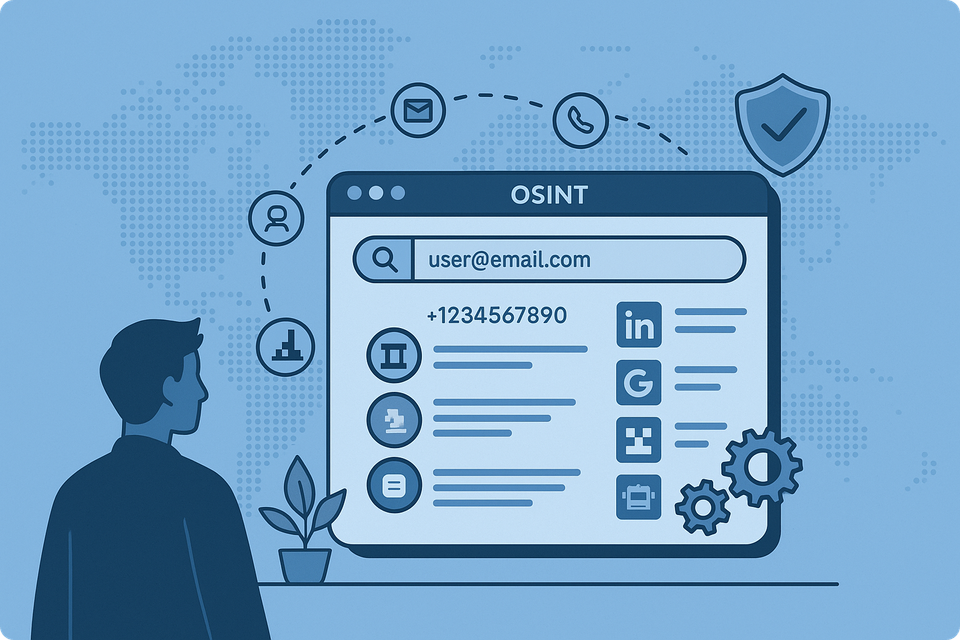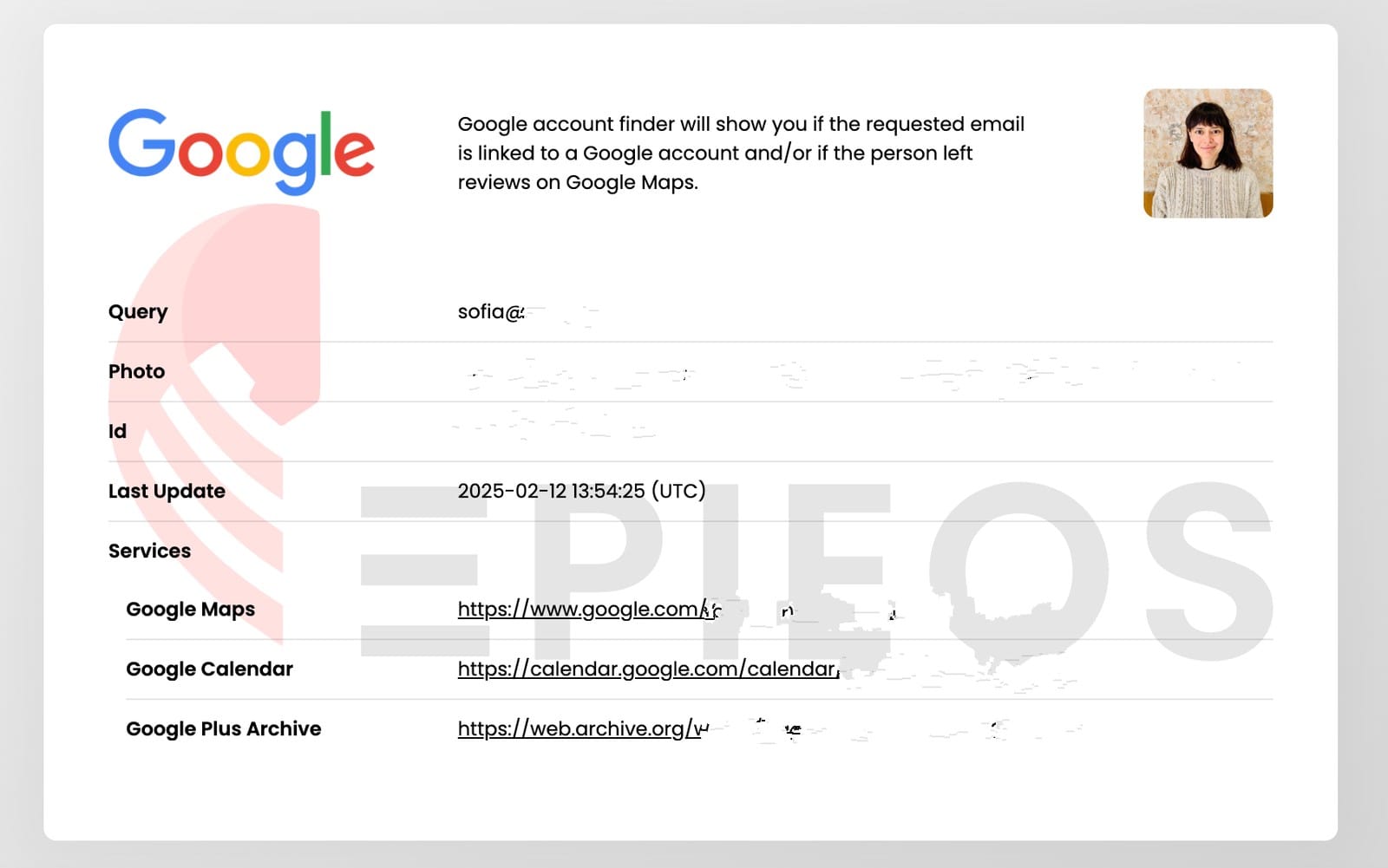Epieos Review 2025: I Found My Digital Footprint in 5 Minutes

I tested Epieos and within five minutes it outlined my digital footprint. The OSINT tool focuses on reverse lookups, using email addresses and phone numbers to uncover connections. It collects public records and links them to the identifier entered.
Epieos runs checks across more than 140 online services. It can surface activity on sites like Chess.com, recover old Google Plus posts, or cross-reference Have I Been Pwned for breach alerts. The free tier gives limited results, such as Google and Skype account data. A subscription costs about $32 per month, or $30 monthly with annual billing, and expands access to detailed modules. The question is whether this belongs in your cybersecurity toolkit.
How Do You Get Started With Epieos?

Epieos requires no installation or configuration. You just have to type your email, and verify your account. Everything runs directly in the browser, so you can begin searching as soon as you open the website. The interface is minimal and organized, designed around a single input field and a list of supported modules.
Access is divided into four tiers:
- Visitor – Allows searches without creating an account. Results are limited to basic modules such as Google, Skype, and Holehe.
- Member – Free registration with a passwordless login. This tier unlocks clickable links in results, smoother captcha handling, and a small upgrade in usability.
- Osinter – A paid tier at €29.99 per month, or €27.08 with annual billing. It includes access to all available modules such as LinkedIn, GitHub, Fitbit, and others. Users receive 30 full-access requests per month and reduced captcha interruptions.
- Custom – A tailored plan for enterprise use. It raises request limits, adds API access, and enables specialized modules not available in other tiers.
During setup, Epieos makes its privacy policy clear. Searches are not logged, results are not stored, and queries are designed to avoid detection by the target. This means each lookup remains private to the investigator.
While many OSINT tools require local installation or steep learning curves, Epieos keeps everything web-based and accessible. Its structure lowers the barrier to entry for new users while still offering depth for professionals who need advanced modules and higher limits.
Real-World Testing: How I Found My Digital Footprint in 5 Minutes

To see how Epieos performs in practice, I began by running a search on my own email address. After solving a simple captcha, the results appeared within minutes. The tool surfaced accounts I had not used in years, including a Nexusmods profile and an old MySpace board. It also highlighted links between different platforms where the same email address had been used, creating a map of my digital footprint that would have taken hours to assemble manually.
Next, I tested a public figure’s work email with their permission. In this case, Epieos connected the address to a secondary social media profile and a Gravatar account. These results showed how the system can uncover connections that remain hidden from regular search engines.
Epieos currently integrates with more than 140 services. The coverage includes large platforms such as Google, LinkedIn, GitHub, Facebook, Pinterest, Strava, Fitbit, Duolingo, Nike Run Club, and ProtonMail. Each lookup compiles publicly available data without logging searches or alerting the target, which makes the process private for the user.
Phone number searches were less detailed than email lookups, but they still produced useful matches. Numbers linked to WhatsApp, Telegram, and Facebook accounts appeared in the results, confirming that the tool can identify major services where phone registration is common.
Testing showed that Epieos does more than return isolated results. It demonstrates how a single identifier—an email or phone number—can connect to a wide range of accounts and services. These links reveal how digital identities are structured across platforms, and how investigators can map them with minimal effort.
Is Epieos Worth the Cost?

Epieos operates on a freemium model. A free “Member” account provides limited results from modules such as Google, Email Checker, and Skype, although the output is watermarked. The Osinter plan, priced at €29.99 per month (around $32) or €27.08 with annual billing, removes these limits and unlocks access to more than 25 modules, including LinkedIn, GitHub, and Have I Been Pwned. This tier also raises the request quota and reduces captcha interruptions. For enterprise teams, a Custom plan adds API access, higher limits, and exclusive modules.
The platform is most effective for email-based investigations. Cybersecurity specialists, OSINT researchers, journalists, and private investigators benefit from its ability to connect an email to accounts across over 140 services.
However, the system has constraints. Phone number lookups return fewer results, especially outside the U.S. Username-based searching is not supported, and because Epieos runs only as a cloud service, customization options are limited.
Alternatives depend on the type of work:
- GHunt is a free, open-source project focused on Gmail.
- Lampyre offers broader investigative functions at $89/month.
- Holehe and Maigret are free options with narrower scope.
- OSINT Industries provides a commercial platform for teams.
- Tools like Skrapp.io, while not direct competitors, are sometimes used alongside OSINT platforms because they focus on finding verified email addresses for business and research contexts.
For people who prioritize email lookups, Epieos delivers strong coverage at a lower cost than many commercial platforms. Those who need broader OSINT capabilities, phone-focused results, or customizable setups may want to pair it with other tools.
Should You Rely on Epieos for Email Investigations?
Testing showed that Epieos can uncover connections most people do not realize exist. Within minutes, it linked one email address to old accounts and inactive profiles, while also highlighting how different platforms share identifiers. These results demonstrate how digital footprints form across the web and why an OSINT tool like this can be valuable for both professional and personal use.
The free tier provides a starting point with limited modules, while the Osinter subscription at €29.99 per month expands access to more than 140 services. For researchers who need reliable email investigations, this level offers reach that conventional search methods cannot provide.
There are, however, limits. Phone number searches return fewer results than email queries, especially for numbers registered outside the U.S. Username lookups are not supported, and the tool only runs as a hosted service with little room for customization.
One of Epieos’s consistent strengths is privacy. Searches are not logged, results are not stored, and targets are not notified. This approach allows both investigators and privacy-conscious users to explore digital exposure without leaving records on the platform itself.
Compared to alternatives, Epieos occupies a middle ground. Free tools like Holehe and Maigret are useful for quick checks, while Lampyre provides broader investigative depth at a higher cost. Other platforms such as Skrapp.io, although not OSINT tools in the strict sense, are sometimes used alongside Epieos for business-focused email discovery. This highlights how investigators and researchers often combine different utilities depending on the type of inquiry.
Overall, Epieos is strongest when the task centers on email addresses. It delivers value by connecting identifiers to a wide set of platforms quickly and privately. Users with broader requirements, such as phone-centric investigations or username analysis—may need to supplement it with additional tools, but for email-based OSINT, it remains a focused and efficient choice.
FAQs: Epieos
Is Epieos worth the investment?
Epieos delivers strong value for professionals in OSINT, cybersecurity, journalism, and private investigation. The free tier is useful for basic results, but the paid plan (about $32 monthly) unlocks detailed data from over 140 online services. For anyone who needs consistent, in-depth email investigations, the upgrade quickly pays for itself.
How does Epieos protect user privacy?
Privacy is one of Epieos’s biggest strengths. It does not log queries or store investigation results, and search targets are never notified. This ensures every lookup remains anonymous, making the platform safe for sensitive research and digital investigations.
What are the limitations of Epieos?
Epieos is best at email-based searches. Phone lookups—especially for numbers outside the U.S.—are limited, and username searches aren’t supported at all. Because it operates only as a cloud service, it lacks the flexibility and customization options that some local OSINT tools provide.
How quickly can Epieos uncover a digital footprint?
In practice, Epieos can outline a full digital footprint in less than five minutes. It checks more than 140 services, surfacing forgotten accounts, hidden links, and old activity that would otherwise take hours of manual digging to uncover.
Are there any free alternatives to Epieos?
Yes, though they come with trade-offs. GHunt is a solid open-source tool for Gmail accounts, while Holehe can check whether an email is registered on certain platforms. These options are useful for light checks, but for comprehensive, email-focused investigations, Epieos’s paid version provides far more depth and coverage.
